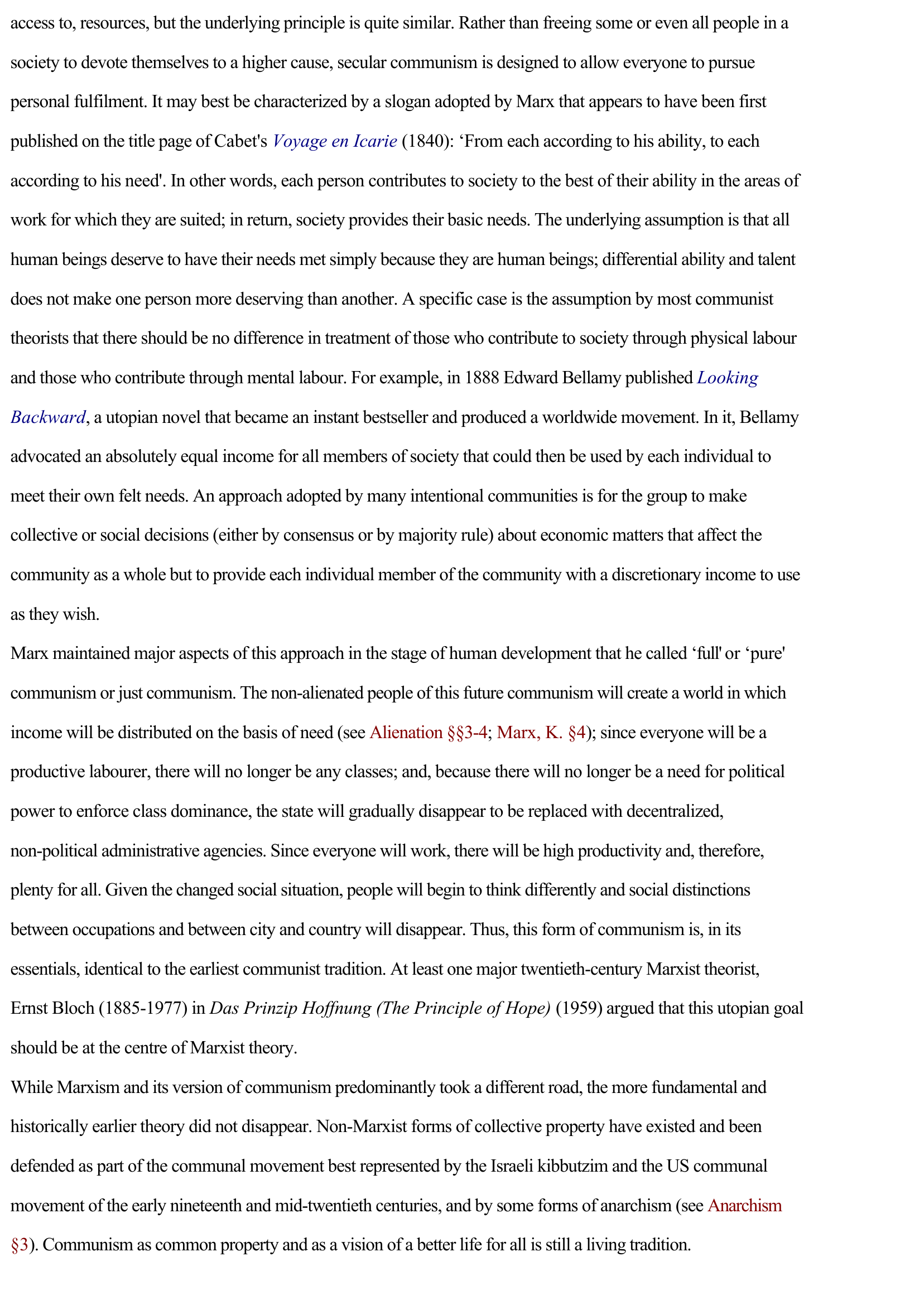Communism
Publié le 22/02/2012

Extrait du document
«
access to, resources, but the underlying principle is quite similar.
Rather than freeing some or even all people in a
society to devote themselves to a higher cause, secular communism is designed to allow everyone to pursue
personal fulfilment.
It may best be characterized by a slogan adopted by Marx that appears to have been first
published on the title page of Cabet's Voyage en Icarie (1840): ‘From each according to his ability, to each
according to his need' .
In other words, each person contributes to society to the best of their ability in the areas of
work for which they are suited; in return, society provides their basic needs.
The underlying assumption is that all
human beings deserve to have their needs met simply because they are human beings; differential ability and talent
does not make one person more deserving than another.
A specific case is the assumption by most communist
theorists that there should be no difference in treatment of those who contribute to society through physical labour
and those who contribute through mental labour.
For example, in 1888 Edward Bellamy published Looking
Backward , a utopian novel that became an instant bestseller and produced a worldwide movement.
In it, Bellamy
advocated an absolutely equal income for all members of society that could then be used by each individual to
meet their own felt needs.
An approach adopted by many intentional communities is for the group to make
collective or social decisions (either by consensus or by majority rule) about economic matters that affect the
community as a whole but to provide each individual member of the community with a discretionary income to use
as they wish.
Marx maintained major aspects of this approach in the stage of human development that he called ‘full' or ‘pure'
communism or just communism.
The non-alienated people of this future communism will create a world in which
income will be distributed on the basis of need (see Alienation §§3-4 ; Marx, K.
§4 ); since everyone will be a
productive labourer, there will no longer be any classes; and, because there will no longer be a need for political
power to enforce class dominance, the state will gradually disappear to be replaced with decentralized,
non-political administrative agencies.
Since everyone will work, there will be high productivity and, therefore,
plenty for all.
Given the changed social situation, people will begin to think differently and social distinctions
between occupations and between city and country will disappear.
Thus, this form of communism is, in its
essentials, identical to the earliest communist tradition.
At least one major twentieth-century Marxist theorist,
Ernst Bloch (1885-1977) in Das Prinzip Hoffnung (The Principle of Hope) (1959) argued that this utopian goal
should be at the centre of Marxist theory.
While Marxism and its version of communism predominantly took a different road, the more fundamental and
historically earlier theory did not disappear.
Non-Marxist forms of collective property have existed and been
defended as part of the communal movement best represented by the Israeli kibbutzim and the US communal
movement of the early nineteenth and mid-twentieth centuries, and by some forms of anarchism (see Anarchism
§3).
Communism as common property and as a vision of a better life for all is still a living tradition..
»
↓↓↓ APERÇU DU DOCUMENT ↓↓↓
Liens utiles
- Communism.
- Communism .
- Since 1989, the date of the collapse of communism, Europe has entered a period of profound reorganisation.
- With the fall of communism the collapse of trade with the former USSR plunged this country into serious economic difficulties.
- The population, composed of Serbs, Croats and Muslims, had to face, after the end of communism, a situation of conflict.








